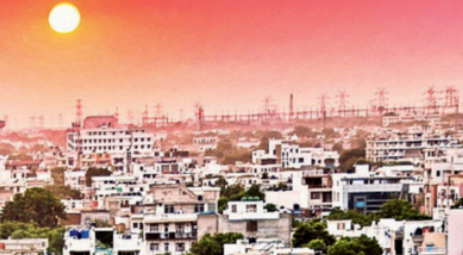
JAIPUR: Average temperature in Jaipur rose by as high as 1.08 degrees Celsius in the two decades between 2001 and 2021, a study by researchers from the School of Earth, Ocean, and Climate Sciences at IIT Bhubaneswar has revealed. The recently published study attributes changes in local climates to impacts of urbanisation.
The study, which includes 141 cities with populations of 1 million and above, identifies reduction in green cover and extensive use of concrete and asphalt in construction as the primary causes behind the rise in temperature.This finding is also supported by India State of Forest Report, authored by a body under the ministry of environment and climate change, as per which the forest cover in Jaipur was only 4.98% in 2021. Less than 10% green cover is unsustainable in densely populated cities like Jaipur, claim experts.
Temperature and climate data gathered through remote sensing were utilised in this study published in the journal ‘Nature Cities’. As per its findings, prepared by research scholars Soumya Satyakanta Sethi and V Vinoj, Ahmedabad is the city that saw the sharpest rise in temperatures in these two decades.
Activities associated with urban growth, especially a decline in ground cover and the proliferation of concrete-based housing, create a “heat island” effect and lead to groundwater depletion, says the study.
In Jaipur, unregulated construction in emerging urban areas like Jagatpura, Bhakrota, Gandhi Path, Sikar Road and Mansarovar Extension, where compliance with green space regulations is often lacking, has exacerbated the problem, say experts.
“An average rise of one degree Celsius can significantly affect various aspects of city life, including infrastructure, public health and the environment. Evaporation rates will increase significantly, stressing water resources. Energy consumption will rise, necessitating an increase in grid capacity and boosting power costs,” said LK Sharma, head of the department of environmental sciences at Central University of Rajasthan.
‘Raj govt needs to revise Jaipur’s devpt plan’
Professor Rashmi Jain, head of the department of sociology at Rajasthan University, said low-income families are particularly vulnerable to the impacts of climate change as they face crises in access to safe drinking water, reliable power supply, proper roads and clean air.
“This study has spurred interest in conducting a field study on how low-income families in Jaipur have been impacted by the rising temperature,” she said.
Kumar Manish, an expert on urbanisation who has reviewed Jaipur’s master plan, said it fails to address modern-day issues arising from climate change.
“The master plan focuses primarily on population projections and infrastructure development, including the incorporation of more villages into urban areas. Such reports highlight the need for Rajasthan govt to revise Jaipur’s development plan, incorporating more detailed studies on this subject,” he said.
“Investing in climate resilience for Jaipur, including measures to enhance green spaces and improve water management, is crucial,” said Manish.



